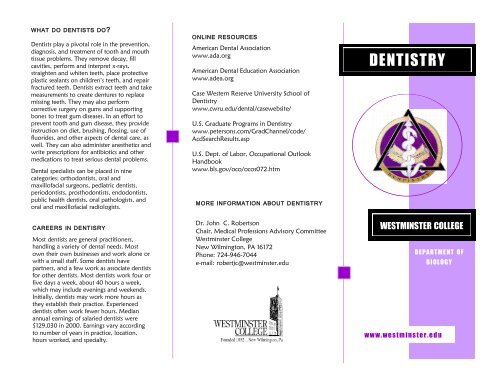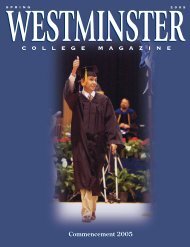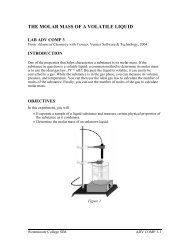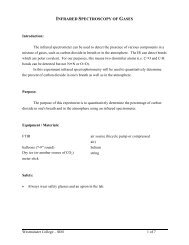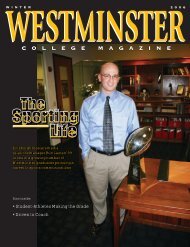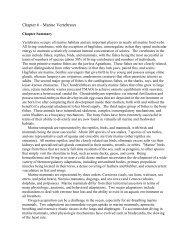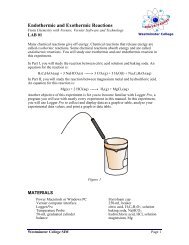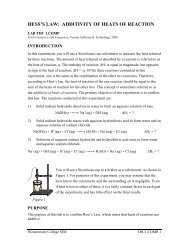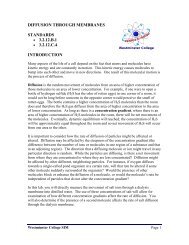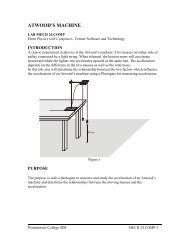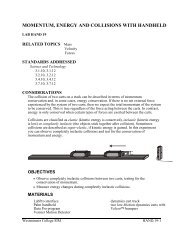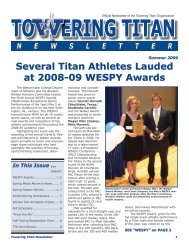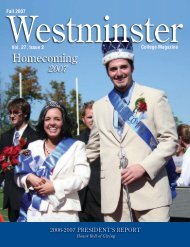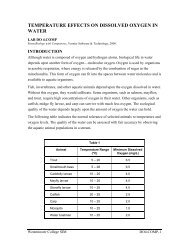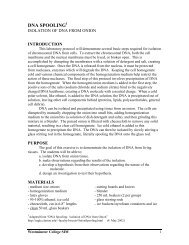DENTISTRY - Westminster College
DENTISTRY - Westminster College
DENTISTRY - Westminster College
- No tags were found...
Create successful ePaper yourself
Turn your PDF publications into a flip-book with our unique Google optimized e-Paper software.
WHAT DO DENTISTS DO?Dentists play a pivotal role in the prevention,diagnosis, and treatment of tooth and mouthtissue problems. They remove decay, fillcavities, perform and interpret x-rays,straighten and whiten teeth, place protectiveplastic sealants on children’s teeth, and repairfractured teeth. Dentists extract teeth and takemeasurements to create dentures to replacemissing teeth. They may also performcorrective surgery on gums and supportingbones to treat gum diseases. In an effort toprevent tooth and gum disease, they provideinstruction on diet, brushing, flossing, use offluorides, and other aspects of dental care, aswell. They can also administer anesthetics andwrite prescriptions for antibiotics and othermedications to treat serious dental problems.Dental specialists can be placed in ninecategories: orthodontists, oral andmaxillofacial surgeons, pediatric dentists,periodontists, prosthodontists, endodontists,public health dentists, oral pathologists, andoral and maxillofacial radiologists.CAREERS IN DENTISRYMost dentists are general practitioners,handling a variety of dental needs. Mostown their own businesses and work alone orwith a small staff. Some dentists havepartners, and a few work as associate dentistsfor other dentists. Most dentists work four orfive days a week, about 40 hours a week,which may include evenings and weekends.Initially, dentists may work more hours asthey establish their practice. Experienceddentists often work fewer hours. Medianannual earnings of salaried dentists were$129,030 in 2000. Earnings vary accordingto number of years in practice, location,hours worked, and specialty.ONLINE RESOURCESAmerican Dental Associationwww.ada.orgAmerican Dental Education Associationwww.adea.orgCase Western Reserve University School ofDentistrywww.cwru.edu/dental/casewebsite/U.S. Graduate Programs in Dentistrywww.petersons.com/GradChannel/code/AcdSearchResults.aspU.S. Dept. of Labor, Occupational OutlookHandbookwww.bls.gov/oco/ocos072.htmMORE INFORMATION ABOUT <strong>DENTISTRY</strong>Dr. John C. RobertsonChair, Medical Professions Advisory Committee<strong>Westminster</strong> <strong>College</strong>New Wilmington, PA 16172Phone: 724-946-7044e-mail: robertjc@westminster.edu<strong>DENTISTRY</strong>WESTMINSTER COLLEGED E P A RTME NT OFB I OL OG Yw w w . w e s t m i n s t e r . e d u
PREPARING FOR A CAREER IN <strong>DENTISTRY</strong>All 50 states and the District of Columbia requiredentists to be licensed. In most states, a candidatemust graduate from a dental school accredited bythe American Dental Association's Commission onDental Accreditation. Dental schools require aminimum of two years of college-level pre-dentaleducation. However, most dental students have atleast a bachelor’s degree. Dentistry requires scientificability, good visual memory, excellent judgment ofspace and shape, a high degree of dexterity,diagnostic ability, and manual skills. Good businesssense, self-discipline, and communication skills arenecessary for success in private practice. To provideall of these skills, the pre-dental college curriculumshould include a strong background in biology,chemistry, physics, math, liberal arts, and generaleducation.All dental schools require applicants to take theDental Admissions Test (DAT). When selectingstudents, schools consider scores earned on the DAT,applicants’ grade point average, and informationgathered through recommendations and interviews.Most dental schools award the degree of Doctor ofDental Surgery (DDS). The rest award an equivalentdegree, Doctor of Dental Medicine (DMD).At <strong>Westminster</strong> <strong>College</strong>, there are several paths to acareer in dentistry. A four-year bachelor’s degree inbiology, chemistry, or physics prepares students forhigh-quality professional practice based on a strongfoundation in the basic sciences. Students in majorsother than biology may be qualified for admission topost-baccalaureate dentistry programs if they havetaken appropriate courses in the natural sciences.Students at <strong>Westminster</strong> <strong>College</strong> may also participatein a 3 + 4-year dentistry articulation with<strong>Westminster</strong> and Case Western Reserve University.That program provides an accelerated course ofstudy for students interested in dentistry and allowsthem to earn both a B.S. from <strong>Westminster</strong> and aDoctorate of Dental Surgery (D.D.S.) from CaseWestern Reserve University. Students in thisprogram are able to complete their education inseven years, rather than the traditional eight.W e s t m i n s t e r C o l l e g eFOUR-YEAR PROGRAM AT WESTMINSTERIn completing a B.S. in biology from <strong>Westminster</strong>,students will satisfy the requirements for admissionto most dental programs in the U.S. This optionallows students to spend four years at <strong>Westminster</strong>and then to apply to programs at a number ofdifferent universities. Admission is extremelycompetitive, so students should strive for a highGPA.Recommended courses:BIO 201 Cell Biology & GeneticsBIO 202 Evolution, Form & FunctionBIO 203 Biodiversity & EcologyBIO 206 BiostatisticsBIO 301 MicrobiologyBIO 303 Molecular Genetics & HeredityBIO 304 Developmental BiologyBIO 335/336 Anatomy & Physiology I & IIBIO 432 Animal PhysiologyBIO 601 CapstoneCHE 117 General ChemistryCHE 180 Inorganic ChemistryCHE 261/262 Organic Chemistry I & IIPHY 151/152 Principles of Physics I & II orPHY 141/142 Foundations of Physics I & IIIn addition, students must complete allrequirements for the <strong>College</strong>’s Liberal Studiesprogram.N e w W i l m i n g t o n , P e n n s y l v a n i a3 + 4 DENTIST RY PROG RAMStudents in this program spend three years at<strong>Westminster</strong> followed by four years at CaseWestern Reserve University. After students havesuccessfully completed their first year at CaseWestern they receive a B.S. degree in biologyfrom <strong>Westminster</strong> <strong>College</strong>. After completing allseven years of the program, they receive a D.D.Sfrom Case Western Reserve University.Required courses:BIO 201 Cell Biology & GeneticsBIO 202 Evolution, Form & FunctionBIO 203 Biodiversity & EcologyBIO 206 BiostatisticsBIO 301 MicrobiologyBIO 303 Molecular Genetics & HeredityBIO 335/336 Anatomy & Physiology I & IIBIO ??? Two Biology electivesCHE 117 General ChemistryCHE 180 Inorganic ChemistryCHE 261/262 Organic Chemistry I & IIPHY 141/142 Foundations of Physics I & II orPHY 151/152 Principles of Physics I & IIIn addition, students must complete allrequirements for the <strong>College</strong>’s Liberal Studiesprogram, excluding the biology capstone andmaintain a cumulative 3.25 GPA in their majorand in all courses taken at <strong>Westminster</strong>.Additionally, students must perform acceptably onthe Dental Admission Test (18 or better on theAcademic Average and Perceptual abilities sections)and be recommended by <strong>Westminster</strong>’s Med PACadvisor.Students who are interested in the pre-dental/dental program with <strong>Westminster</strong> <strong>College</strong> andCase Western must apply to both <strong>Westminster</strong><strong>College</strong> and the CWRU School of Dentistry in thesenior year of high school. Only those studentspre-accepted by Case Western are eligible to enterthis program at <strong>Westminster</strong> <strong>College</strong>


